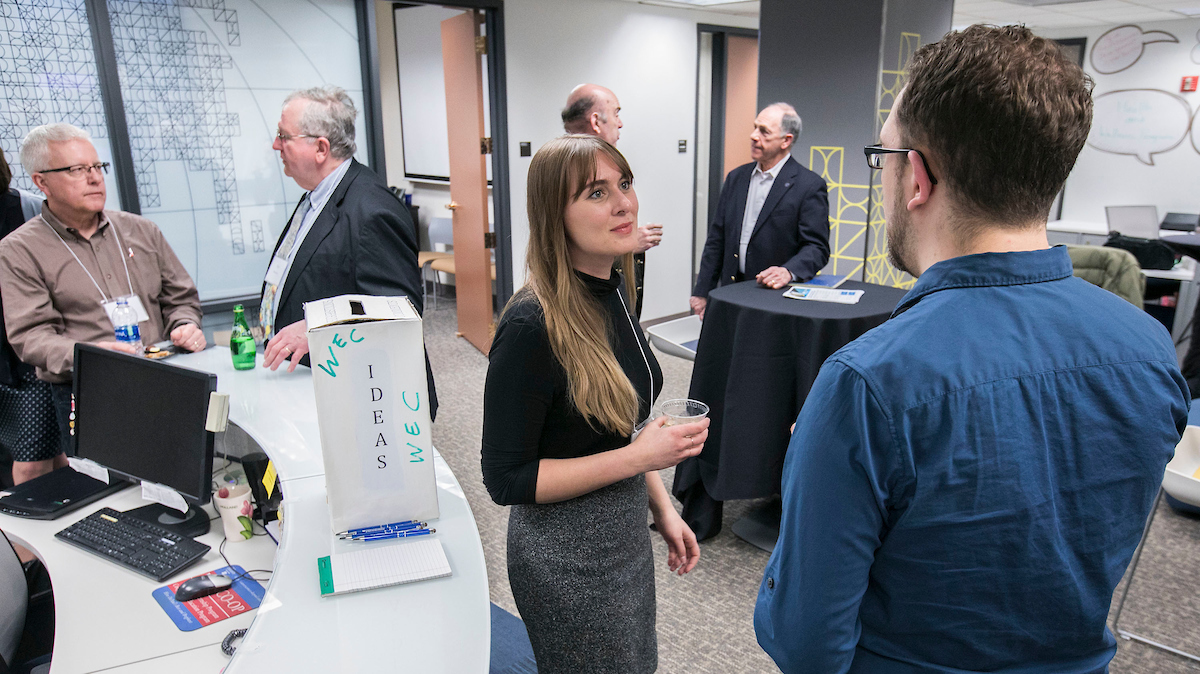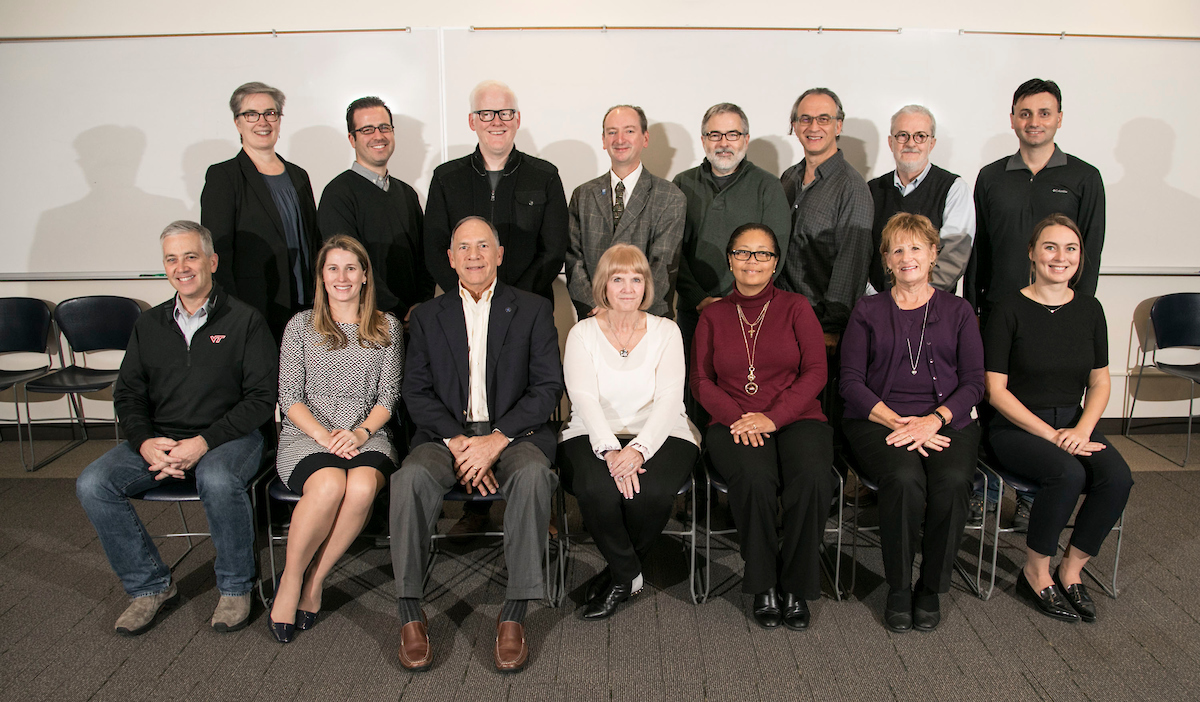 Victoria Hohenzy, chair of the Workplace Environment Committee (WEC) left, speaks with Kalin Noel, an advisor in the Career Center, as she and other adjunct faculty members attended a networking event on March 5 hosted by the WEC. (DePaul University/Jamie Moncrief)
Victoria Hohenzy, chair of the Workplace Environment Committee (WEC) left, speaks with Kalin Noel, an advisor in the Career Center, as she and other adjunct faculty members attended a networking event on March 5 hosted by the WEC. (DePaul University/Jamie Moncrief)
Now in its second year, the Workplace Environment Committee, or WEC, is an elected body that hears, reports and suggests resolutions for workplace issues affecting the lives of adjunct faculty members.
The group has been busy in 2017-18, in part by creating more opportunities for adjunct faculty to learn about university resources and to meet one another. It held a resource fair in November and networking events in March. On Tuesday, May 8, the WEC and Academic Affairs will co-host the annual Adjunct Faculty Appreciation Reception from 5-7 p.m. at Cortelyou Commons, 2324 N. Fremont St. All DePaul adjunct faculty members are invited to attend.
To learn more about the WEC's recent activities, read this interview with Victoria Hohenzy, an adjunct faculty member in the Department of Writing, Rhetoric and Discourse. Hohenzy is chair of the WEC and has been an elected member since DePaul formed the committee.
This is the Workplace Environment Committee's second year in existence. What has been the committee's focus this academic year?
The first year of the WEC was such a learning process. A lot of our focus was on educating ourselves about how the university functions, what resources are available, and where the WEC and adjunct faculty fit into the conversation. In our second year, we're really focused on making some progress in the initiatives we began last year, particularly related to compensation for work outside of teaching and best practices for review and reappointment.
We're also continuing to plan events to connect adjuncts and to help make existing resources and benefits more accessible.
You've been an adjunct faculty member at DePaul since 2011. What difference has the creation of the WEC made in the professional lives of DePaul's adjunct faculty?
The WEC has given adjunct faculty somewhere to go with questions and concerns. Our constituents come to us with such a diverse range of needs, and we do everything we can to help. Some days, we will talk to faculty who just need assistance accessing the materials and resources they need for their courses. Other times, we may have a conversation with faculty who have profound issues with course scheduling. In some cases, we are able to help connect them to the right person or resource, and when we're not, we are able to voice that concern to the university or suggest a range of possible solutions to continuing problems.
Before the WEC, adjuncts may not have always known who to go to, and the university didn't really have a mechanism for keeping track of these ongoing issues facing adjunct faculty university-wide. We are there to be a resource, but we are also there to be a voice in DePaul's ear reporting these issues and helping to fix them.
What's your advice for an adjunct faculty member who would like to become more engaged in university life at DePaul?
Make your voice heard and your face seen, and let your WEC representatives help where we can. Opportunities for involvement vary so widely across DePaul. There is truly no one-size-fits-all opportunity here, but expressing your interest is a good first step. I encourage adjuncts to attend department events and department meetings, if welcome, and ask if there are ways they can participate and really use their subject knowledge and expertise where it has the most impact.
Beyond involvement in your own department or college, consider attending events that the WEC hosts throughout the year for adjuncts to network, collaborate, and learn more about resources and benefits. These occasions are great for getting to know other adjuncts and finding out about what projects they're involved in as well. These conversations and connections can be really enlightening.
What initiatives are in the WEC's future?
In addition to ongoing projects that focus on more opportunities for adjunct faculty to be compensated equitably for lending their expertise and experience to work outside the classroom, we would also love to see more consistency and transparency in the review and reappointment of adjunct faculty, and a more flexibility in the benefits policy.
There is so much diversity in the ways in which not only the individual colleges function, but also the departments within them as well. This means that there is rarely going to be a "one-size-fits-all" policy, so we're suggesting a range of solutions and ideas. In regards to compensation for service, this could mean paying adjunct faculty for professional development or for participating in committee work in their department. Adjuncts have so much expertise and experience that could be better utilized by the university, but they deserve to be paid for that work.
It's become very clear that the kind of changes needed at DePaul will take time, but we're working hard to make it happen.
 Members of the 2017-18 Workplace Environment Committee. Seated (l-r): Paul Winters (College of Law), Mary Mindak (ex officio, chair of Faculty Council's Committee on Contingent Faculty), Paul Kessenich (Driehaus College of Business), Ilene Karol (College of Education), Nadia André (College of Liberal Arts and Social Sciences), Peggy St. John (School for New Learning), Victoria Hohenzy (College of Liberal Arts and Social Sciences); Standing (l-r): Lucy Rinehart (ex officio, associate provost for academic programs and faculty), Neal Heitz (College of Communication), Nathan DeWitt (College of Computing and Digital Media), Jeff Kowalkowski (School of Music), Jack Magaw (The Theatre School), Mark Zlotkowski (College of Liberal Arts and Social Sciences), Vladmir Lepetic (College of Science and Health); Not pictured: Barry Hollingsworth (Driehaus College of Business) (DePaul University/Jamie Moncrief)
Members of the 2017-18 Workplace Environment Committee. Seated (l-r): Paul Winters (College of Law), Mary Mindak (ex officio, chair of Faculty Council's Committee on Contingent Faculty), Paul Kessenich (Driehaus College of Business), Ilene Karol (College of Education), Nadia André (College of Liberal Arts and Social Sciences), Peggy St. John (School for New Learning), Victoria Hohenzy (College of Liberal Arts and Social Sciences); Standing (l-r): Lucy Rinehart (ex officio, associate provost for academic programs and faculty), Neal Heitz (College of Communication), Nathan DeWitt (College of Computing and Digital Media), Jeff Kowalkowski (School of Music), Jack Magaw (The Theatre School), Mark Zlotkowski (College of Liberal Arts and Social Sciences), Vladmir Lepetic (College of Science and Health); Not pictured: Barry Hollingsworth (Driehaus College of Business) (DePaul University/Jamie Moncrief)